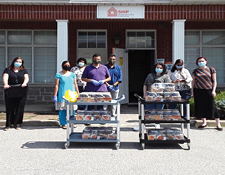Providing tenant supports during COVID-19: provider practices

Since the Province first announced emergency orders aimed at limiting the spread of COVID-19, community housing providers have adapted their services and practices in line with regulations. This has been a mammoth adjustment for housing providers, especially for organizations that provide supports to their residents and communities.
ONPHA’s Member Support team has fielded a great many inquiries from supportive housing providers since the start of the pandemic. Many of these questions are focused on how they can keep their communities safe and supported.
We gathered together leaders in supportive housing to discuss their responses to COVID-related challenges in a webinar offered to ONPHA members earlier this year. Read on to hear what they had to say.
Limiting building traffic to protect tenants
Carol Zoulalian, Executive Director with St. Jude Community Homes, describes implementing policies during COVID-19 as “building the plane as we’re flying it”. She says that the pandemic “has highlighted broadening inequity for tenants and other vulnerable groups [and] policy gaps”, but notes that it has also allowed “opportunities for flexibility, evaluation, innovation and creativity”.
In terms of limiting access to residential buildings vs. tenant rights, Carol stresses that the Province’s emergency measures and associated responsibilities apply to everyone, so applying restrictions is not a violation of tenants’ rights. The restrictions St. Jude implements are time-limited in line with provincial emergency orders and tenants are engaged for feedback on an ongoing basis.

Carol says that St. Jude’s focus is to reduce traffic in buildings, decreasing the risk of infection from tenants and essential workers. St. Jude has locked the front doors of their buildings, installing a buzzer for outside access. They have also limited touch services by modifying fobs so doors open automatically and have installed wave-operated exits.
At the beginning of the pandemic, St. Jude was looking for ways to work with tenants who continued to have guests over. Carol tells us that it was important to engage with them to understand their behaviour – whether it was caused by addiction, to help them cope with mental illness, to help friends who were experiencing homelessness, or if their actions were caused by a lack of awareness. She says that such residents were helped to understand that they were putting their own housing at risk by continuing to have guests.
Carol feels that the glut of information out there regarding the pandemic can be hard to decipher and that St. Jude’s tenants are tired of social distancing just like everyone else. Throughout the pandemic, St. Jude has been in a state of constant learning and adjustment to work with tenants to help keep them safe. By and large, she says that St. Jude’s residents appreciate the restrictions, as they help them feel safe in their homes.
Harm reduction approaches for tenants with addictions during the pandemic
Heather McDonald, CEO of LOFT Community Services, explains that the pandemic has meant that there are fewer harm reduction services available to individuals who use drugs and alcohol. Those who use these substances face greater health risks due to COVID-19 and have a harder time self-isolating. She points to the surge in overdoses during the pandemic as another risk faced by these individuals.

Heather’s advice to supportive housing is “Don’t have your head in the sand about this. Don’t pretend not to see it”. She stresses that shame is a factor in substance use, and there should be a non-judgmental space for people to talk about their needs. Heather outlines the steps LOFT has taken to help support residents who use drugs and alcohol to reduce their risk of being exposed to COVID-19:
- Encouraging those using substances to manage their drug supply, reducing the need for contact with others
- Enforcing the importance of good hand hygiene
- Encouraging those using substances to take care of their space and equipment they may be using
- Reinforcing that residents should go out less
- Roleplaying how residents might carry out a socially distanced drug deal or alcohol purchase and use
- Asking residents to plan for a disruption in their supply chain and to think about how that will look and how they will handle it
- Preparing (staff and residents) for a possible overdose
- Training everyone on new COVID CPR guidelines
- Placing CPR equipment kits for staff to access quickly for those at risk of needing CPR
- Providing cloth masks and teaching residents how to launder them, how to put them on and take them off properly
Heather underscores the need to provide specialized supports to keep residents safe, but stresses that the time commitment from staff is high for coaching and support. Managing this in a sustainable way as the pandemic wears on is a challenge for our sector.
Supporting self-isolation and preventing outbreaks
Cory O’Handley, Director of Projects and Housing Development for Services and Housing In the Province (SHIP), says that the populations that SHIP supports are already marginalized on any given day and that the pandemic has turned things “upside-down” for these individuals.
Cory says that SHIP has focused on modifying and redeveloping their services so they can continue to support their clients. To do so, they have developed what he describes as a “two-pronged approach”. The first prong evaluates SHIP’s current caseload and the evaluated risk levels for those they support, ranking individuals’ needs on a scale from 1-3, 1 being the most complex
Individuals whose needs are ranked as ‘1’ need more support with addictions, mental health, other behavioural issues, and/or have compromised health. These individuals will continue to receive face-to-face supports.

Those whose needs are ranked as a ‘2’ or ‘3’ will receive support by telephone. SHIP is working to implement a virtual system for providing supports online, and are looking at getting funding to provide those who want to engage online with the tools to do so.
The second prong of SHIP’s approach works to address the long waitlist for access to housing. They have developed a service response strategy which looks to address the needs of those who are currently on the waitlist for services. SHIP has created teams to manage the waitlist and identify those who may be isolated and to provide supports to those coming off the waitlist, including those experiencing food insecurity.

Cory says that SHIP has been grateful for community support and donations of food, gardening and cleaning supplies. He wants to make it clear that the populations they support are “resilient and not given enough credit”. Cory says that those they support “appreciate education and communication so they can do the right thing and support the community as we battle COVID-19”.
We’re stronger together
The challenges facing community housing providers during the pandemic are many, but our strength as a sector lies in our collective knowledge and experience. The way we support each other by sharing best practices and pooling resources is a testament to how much stronger we are when we come together.
View the webinar COVID-19 and Supporting Vulnerable Tenancies for more insights into how supportive housing providers are adapting their services during the COVID-19 pandemic. Visit our COVID-19 Resources Hub to get information, guides and templates that to help your organization operate safely. Many of these resources were shared by ONPHA members.
Questions about operating or maintaining tenant supports during the pandemic? Have a resource you’d like to share with your peers? Contact us at member.support@onpha.org. We’re always happy to hear from you, and to help!




